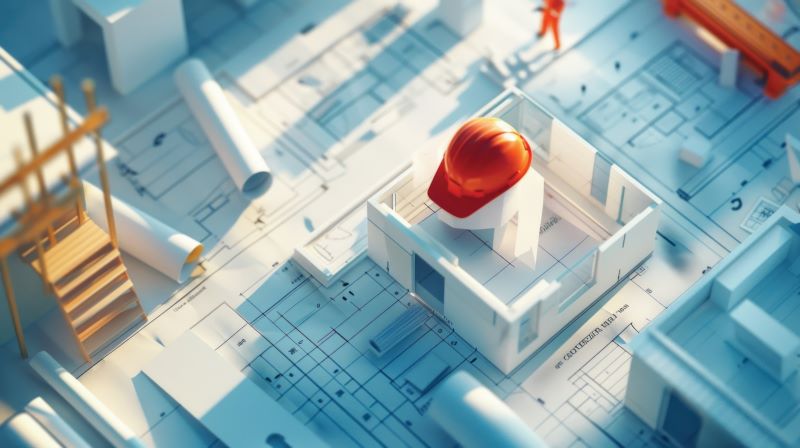Better Buildings: Enhancing Resilience and Addressing Defects in Strata Communities

In recent years the strata insurance industry has witnessed an increase in claims from flooding, hail, bushfires and cyclone events. These events are becoming more frequent due to the impacts of climate change, demanding new strategies and heightened preparedness in the strata market.
Building resilience is no longer just an option; it’s a necessity.
For strata communities, strengthening the resilience of buildings is essential to mitigating the impact of extreme weather events and ensuring that properties can withstand these growing challenges. This involves technological advancements and updates to building codes as well as a renewed focus on regular maintenance and proactive management of potential building defects.
The importance of regular building maintenance
Routine building maintenance is one of the most effective ways to ensure that a property remains resilient in the face of extreme weather. Regular inspections and timely repairs can prevent minor issues from escalating into significant defects which in extreme circumstances could compromise the structural integrity of a building. For strata property owners, having a proactive maintenance schedule can help prevent costly repairs down the track.
Preventative maintenance includes everything from checking the integrity of the roof and waterproofing to ensuring that drainage systems are functioning correctly and that fire safety measures are up to date.
CHU, a leading strata insurance provider, has introduced new technologies which has made scanning and inspecting buildings both safe and cost effective. CHU Inspect uses drone and LiDAR technology to provide efficient and accurate data and reporting by producing a digital twin of the building which can then be tagged and annotated with all the essential details of the building.
With this information, recording and logging regular maintenance can help strata properties avoid the complications that arise from insurance claims related to building defects. Well-maintained properties are less likely to encounter issues with insurance coverage.
Addressing building defects
Building defects are a significant concern in the strata industry, particularly in new developments. These defects can range from minor issues, like leaks or cracks, to more severe structural problems that can affect the safety and habitability of a building.
A recent survey of NSW property owners, facilitated by the NSW Building Commissioner in conjunction with SCA NSW, reported an average of 53% of buildings across the survey have one or more serious defects in their common property. The graph in Figure 3 shows the common defects found across those surveyed.
While this survey was conducted in NSW, the issue of defects has been identified across Australia and 22 recommendations were put forward in a Building Confidence Report1 conducted in 2018, many of the recommendations centred around having a national approach to compliance and enforcement of regulations for the building and construction industry.
CHU has established a National Specialty Risk Team who work with property owners on a case-by-case basis, considering factors such as the severity of the defects, the age of the building, any ongoing legal actions, and the proactive efforts of the owners to rectify issues.
Figure 3 Types of serious defects among all buildings

Source: https://www.nsw.gov.au/sites/default/files/noindex/2023-12/strata-defects-survey-report.pdf
Information required for defect evaluation
To accurately assess the risk posed by building defects, CHU requires detailed information, including:
- Professional consultant reports detailing the extent of the defects
- Building contracts for planned remedial works
- Minutes from Body Corporate meetings that discuss defect management and funding
- Expert assessments on the impact and proposed remedies for the defects
This comprehensive approach ensures that properties are adequately protected and that any existing issues are managed effectively.
Building resilience for the future
Strata property owners who prioritise maintaining and upkeeping their property are not only protecting their investment but also contributing to the safety and sustainability of their communities.
At CHU, there is a commitment to supporting strata communities in building resilience. This includes not only offering comprehensive strata insurance coverage but also providing guidance on best practices for maintenance and defect management. By working together with strata property owners, strata managers and insurance brokers, CHU aims to create a future where buildings are better equipped to withstand the challenges of a changing climate, ensuring safety, sustainability, and peace of mind for all.
To learn more about risk mitigation and building resilience, or to obtain a strata insurance quote, contact the CHU team via www.chu.com.au or info@chu.com.au.
Disclaimer: CHU Underwriting Agencies Pty Ltd (ABN 18 001 580 070, AFS Licence No: 243261) acts under a binding authority as agent of the insurer QBE Insurance (Australia) Limited (ABN 78 003 191 035, AFS Licence No: 239545). Any advice in this article is general in nature and does not consider your personal objectives, financial situation, and needs. Please read the relevant Product Disclosure Statement (‘PDS’), Financial Services Guide (‘FSG’), and the Target Market Determination (‘TMD’), which can be viewed at www.chu.com.au or obtained by contacting CHU directly.
View Comments
(0)